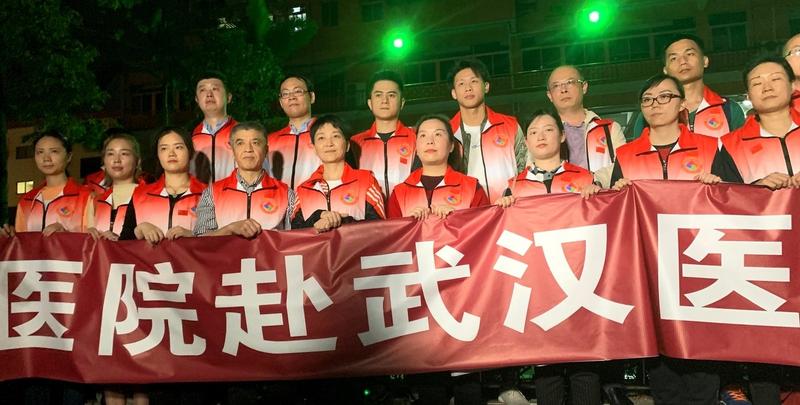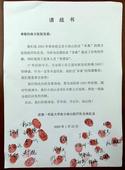Individuals from all walks of life are contributing to the fight against the deadly disease. Yang Zekun reports.
 Medical professionals from Nanfang Hospital in Guangzhou, Guangdong province, pose for a photo before heading to Wuhan, Hubei province, to help fight the novel coronavirus last month. (PHOTO PROVIDED TO CHINA DAILY)
Medical professionals from Nanfang Hospital in Guangzhou, Guangdong province, pose for a photo before heading to Wuhan, Hubei province, to help fight the novel coronavirus last month. (PHOTO PROVIDED TO CHINA DAILY)
"We are in a war against the coronavirus-there is no good reason to run away when you can be a fighter."
That's what Zhang Zhan, a doctor from Wuhan, Hubei province, was thinking when she volunteered to work at the forefront of the "battlefield" against the coronavirus outbreak, which started in the city.
Before the outbreak, Zhang was a senior doctor in the outpatients clinic of the Department of Respiratory and Critical Care Medicine of Renmin Hospital at Wuhan University. She does not know when she will return to her old job.
We have no regrets about our decision. We will marry when I return home after our victory
Sun Chunxuan, male nurse from Jiangsu province, who postponed his wedding and volunteered to go to work in Wuhan
Faced with a rising number of confirmed cases at the hospital, Zhang volunteered to work in the observation room, where she would meet and interact with a large number of infected patients. That would place her at greater risk of becoming infected.
Zhang is an experienced doctor. She worked at Guangdong Second Provincial General Hospital in Guangzhou, Guangdong's capital, treating patients infected during the 2003 outbreak of severe acute respiratory syndrome.
As a result, she was fully aware of the risk of becoming infected with the coronavirus, especially as medical supplies such as face masks were in short supply.
She said being a long-stay doctor in the observation room allows her to observe the patients constantly and eases the burden on the other doctors-who rotate shifts in the observation room-as she provides the lion's share of the treatment.
"As a doctor, the battlefield can be everywhere," Zhang said in a petition she wrote when she volunteered for the job. She decided not to tell her husband about the petition, as he is a neurosurgeon at the same hospital and she didn't want him to worry about her.
Zhang submitted her application on Jan 18 and quickly obtained approval from hospital authorities. That was when life began to get hectic.
Hectic working life
Since then, she has worked 8 am to 5 pm most days, but has also rotated to work night shifts. On a normal working day, she makes as many as 50 phone calls, checks more than 40 units and attends numerous emergency consultations. She has only taken one break while on duty, having rested for just 10 minutes at noon on Jan 20, when she had hypoglycemia.
Zhang often attends clinical treatment meetings during the day and conducts related research at night. She keeps thinking about the cases and writing down her thoughts at work, and later shares her experience with front-line doctors.
Her intense schedule is reflected in her log.
"January 19, night shift: I took charge of both the fever clinic and the observation room on the second floor. I began answering consultation calls before it was time for work. From 5 pm to 10:45 pm, there were 24 medical calls," Zhang wrote.
"Of course, I(worked hard) trying to understand the causes and come up with personalized treatment plans for those infected. There could be similarities in the treatment of the unexplained pneumonia. Although we don't have a proven, effective treatment for the coronavirus, it won't stop us from offering all the treatment we can to the patents."
 A written request by a medical team to battle the virus. (PHOTO PROVIDED TO CHINA DAILY)
A written request by a medical team to battle the virus. (PHOTO PROVIDED TO CHINA DAILY)
Commitment
She is not alone in her fight. Since the outbreak started, more than 7,000 employees of Zhang's hospital and tens of thousands of medical personnel from across the country have committed themselves to fighting the epidemic. Many gave up their Spring Festival holidays to join the battle.
As of 8 pm on Feb 5, a total of 107 medical teams and 10,596 medical team members were assisting with prevention and treatment work in Hubei, including 9,061 medical team members in Wuhan.
Sun Chunxuan, a male nurse from Jiangsu province, volunteered to go to Wuhan when he heard that the Jiangsu government was recruiting local medical staff members to support the stricken city.
He even postponed his wedding after discussing the matter with his fiancee, a doctor who runs a clinical laboratory at a hospital. In turn, she volunteered to work at fever clinics in Nanjing, Jiangsu's capital.
"We have no regrets about our decision. We will marry when I return home after our victory," Sun said.
In addition to medical staff members, hundreds of thousands of people are actively seeking ways to make a contribution, either on the front line or through donations of money, food, face masks and other items, either from their homes or workplaces.
On Jan 28, about 45 sanitation workers in Wuhan volunteered to help clean local hospitals.
Cao Yinxiu, a 47-year-old who has worked in the sector for 12 years, was one of them. Last year, the industry veteran participated in cleaning work at several major events, including the World Fly-in Expo and the World Military Games, which were both held in Wuhan.
Cao said she and her colleagues were well-prepared for the task. "If there's anything I can do to help, I will certainly try," she said, adding that she had to persuade her son that she would be OK, as he was strongly opposed to her decision initially.
When he heard about the spread of the coronavirus, Muhammad Usman Janjua, 29, who lectures in clinical internal medicine at Changsha Medical University in Hunan province, wrote to the authorities and asked for permission to join the fight in Wuhan.
Having arrived in China in 2007, the Pakistan-born practitioner graduated from Hunan University of Chinese Medicine with a bachelor's in 2012. He joined the Central South University in Changsha to study for a master's in internal medicine in 2016, and became a lecturer at the medical university after finishing grad school.
"It is a doctor's duty and mission to heal the wounded and assist the dying. I am still awaiting approval. If I cannot go to Wuhan, I will do my best to help the hospital in Changsha and the students at the university, and give a professional interpretation of the virus and psychological counseling to overseas students," he said.
Donations
Earlier this month, a series of photos made waves online. They were taken after people from a village in Henan province donated 50 metric tons of green Chinese onions to epidemic-stricken areas. Despite the residents' low incomes, more than 300 of them helped to harvest the onions and donate them to Hubei.
Similarly, people from a mountain village in Yunnan province donated 22 tons of bananas to Wuhan, with hundreds of residents transporting the fruit down the mountain on motorcycles. Moreover, many truck drivers have supported Hubei by delivering necessities such as food from other areas to places hit by the epidemic.
Doctors, nurses, teachers, sanitation workers, farmers, truck drivers and construction workers: Those groups and others have all made concerted efforts to support the people of Hubei. By Feb 1, the province had received donations of about 7 billion yuan (US$1 billion), according to the local government.
As of Feb 7, central government departments, along with other provinces and cities, had provided more than 10 million items of medical equipment for Hubei, while private individuals from all walks of life had donated more than 10 million pieces of protective medical equipment to help the province in its fight against the virus.
Contact the writer at yangzekun@chinadaily.com.cn


